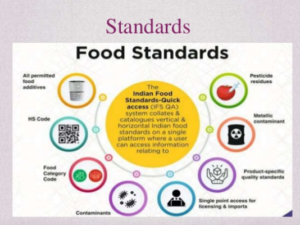DIPLOMA NOTES-HYGIENE & SANITATION-FSSAI-FOOD SAFETY & STANDARDS AUTHORITY OF INDIA
FOOD SAFETY STANDARDS AUTHORITY OF INDIA (FSSAI)
Introduction to FSSAI
FSSAI stands for “FOOD SAFETY AND STANDARDS AUTHORITY OF INDIA”.It is an autonomous body established under the Ministry of Health & Family Welfare, Government of India.The FSSAI has been established under the Food Safety and Standards Act, 2006.[5 FSSAI is responsible for protecting and promoting public health through the regulation and supervision of food safety. The FSSAI is headed by a non-executive Chairperson, appointed by the Central Government, either holding or has held the position of not below the rank of Secretary to the Government of India.The FSSAI has its headquarters at New Delhi. The authority also has 6 regional offices located in Delhi, Guwahati, Mumbai, Kolkata, Cochin, and Chennai. 14 referral laboratories notified by FSSAI, 72 State/UT laboratories located throughout India and 112 laboratories are NABL accredited private laboratories notified by FSSAI.
Established on 5 August 2011 under Food Safety and Standards Act, 2006 operationalized in the year 2006. The FSSAI consists of a chairperson & 22 members. The FSSAI is responsible for setting standards for food so that there is one body to deal with and no confusion in the minds of consumers, traders, manufacturers, and investors. Ministry of Health & Family Welfare, Government of India is the Administrative Ministry of Food Safety and Standards Authority of India.
The FSS Act
The FSS stands for THE FOOD SAFETY AND STANDARDS ACT (FSS), 2006 is the primary law for the regulation of food products. This act also sets up the formulation and enforcement of food safety standards in India.
The FSS Act took 8 older acts into one umbrella.
- Prevention of Food Adulteration Act, 1954
- Fruit Products Order, 1955
- Meat Food Products Order, 1973
- Vegetable Oil Products (Control) Order, 1947
- Edible Oils Packaging (Regulation) Order 1988
- Solvent Extracted Oil, De- Oiled Meal and Edible Flour (Control) Order, 1967
- Milk and Milk Products Order, 1992
Thus the FSS Act is a bucket for all the older laws, rules and regulations for food safety
The following are the statutory powers that the FSS Act, 2006 gives to the Food Safety and Standards Authority of India (FSSAI).
- Framing of regulations to lay down food safety standards
- Laying down guidelines for accreditation of laboratories for food testing
- Providing scientific advice and technical support to the Central Government
- Contributing to the development of international technical standards in food
- Collecting and collating data regarding food consumption, contamination, emerging risks, etc.
- Disseminating information and promoting awareness about food safety and nutrition in India
Role of FSSAI
The main aim of FSSAI is to
- Lay down science-based standards for articles on food
- To regulate the manufacture, storage, distribution, import, and sale of food
- To facilitate the safety of food
FUNCTIONS OF FSSAI
Departments of FSSAI
- Import Division
- International Co-operation
- Regulatory Compliance Division (RCD)
- Food Safety Management System (FSMS) Division
- Risk Assessment and R&D division (RARD)
- Information Education Communication (IEC) Division
- Regulation and Codex Division
- Quality Assurance/ lab Division
- HR Division
- Standards Division
Research and Quality assurance
Research The Research and Development division is responsible for research with the following objectives:
- Generate new knowledge that would help in continuously updating and upgrading food safety standards which are compatible with international organizations
- Carry out evidence based studies for improving or building policies
Quality Assurance
- FSSAI has been mandated to perform various functions related to quality and standards of food.
- These functions in addition to others include “Laying down procedure and guidelines for notification of the accredited laboratories
Standards
Standards framed by FSSAI are prescribed under Food Safety and Standards Regulations, 2011 (Food Product Standards and Food Additives, Packaging and Labelling, Contaminants, Toxins, and Residues).
The FSSAI has prescribed standards for following food products:
- Dairy products and analogues
- Fats, oils and fat emulsions
- Fruits and vegetable products
- Cereal and cereal products
- Meat and meat products
- Fish and fish products
- Sweets & confectionery
- Sweetening agents including honey
- Salt, spices, condiments and related products
- Beverages, (other than dairy and fruits & vegetables based)
- Other food product and ingredients
- Proprietary food
- Irradiation of food

FSSAI compliance
Applicable FSSAI License
FSSAI issues three types of license based on nature of food business and turnover:
- Registration: For Turnover less than 12 Lakh
- State License: For Turnover between 12 Lakh to 20 Crore
- Central License: For Turnover above 20 Crore
Other criteria like the location of the business, number of retail stores etc. is needed while evaluating the nature of license applicable.
Realizing the necessity to regulate the manufacture, storage, distribution, sale, and import of food products, Government of India consolidated Food Safety and Standards Act (FSSA), 2006. The Act hereby establishes Food Safety and Standards Authority of India (FSSAI) to ensure the availability of safe and wholesome food for human consumption. This national regulatory body provides food regulatory compliance as per the international standards.
Food regulatory compliance in India categorizes food products as:
Standardized products: for which standards have been prescribed and no prior product approval is required.
Non-standardized food products: products which do not have safety parameters defined.
At present FSSAI has standardized 380 food articles in 16 categories. Those food articles that are non-standardized require product approval. It is important to note that traditional foods and their ingredients or additives require product approval. These product approvals are provided by FSSAI under the jurisdiction of various regulations that have been embedded.
The Food Safety and Standards Act (FSSA), 2006 has made it mandatory for all business operators to follow food business compliances. These include licenses and registrations in accordance with the Food Safety and Standards (Licensing and Registration of Food Business) Regulations, 2011. It further ensures safety, sanitary, and hygiene of food products offered by food business operators to the welfare of customers of the country. It is a compulsion for all food business operators to obtain a license from FSSAI, including entities right from post farming, manufacturing, selling, retailers, labeling, and more.
The preamble of FSSAI act also aims to provide food safety to the consumers. It has developed a checklist to ensure efficiency and transparency in food safety inspections.
List of compliances developed by FSSAI
- General manufacturing,
- Milk processing units,
- Meat processing units,
- Slaughterhouses,
- Catering,
- Retail,
- Transport, and
- Storage and warehouse units.
These legal compliances are regarding
- The design and facilities provided in the unit,
- control of their operations,
- maintenance and sanitation,
- Personal hygiene,
- Training and complaint handling in these units.
Some Important Points
- Over the years, increased awareness has been seen regarding the quality of food and its safety. Whether the product is imported or homemade the Food safety and standards authority of India(FSSAI) is monitoring and surveying of food business operators under the provisions of Food Safety and Standards Act (FSSA), 2006. It is important to note here that since the administrative control of FSSA has been assigned to the FSSAI body, it thereby holds to be the single reference point authority. There have been 68 food testing laboratories accredited by FSSAI that have been established under FSSA, 2011 Regulations.
- FSSAI License compliances also include Food Safety and Standards (Food Products Standards and Food Additives) Regulations, 2011. It provides quality compliance such as a sample of any food article has to be sent to the food analyst of a notified laboratory. The referral laboratory will conduct tests and investigate the food samples for the purpose of fixation of food standards for that food item. In order to maintain high standards of accuracy, reliability, credibility, high professional discipline is followed in the laboratories.
- FSSAI compliances have been extended to provide quality food to avoid food adulteration, Contamination of food at any point in time, before it reaches the consumer is a major issue. For this purpose, food business compliances have been issued under Food Safety and Standards (Contaminants, Toxins, and Residues) Regulations, 2011.
Various aspects covered under this are:
- Cross contamination: This includes any substance that has been added unintentionally to the food, as a result of environmental contamination. Cross contamination may occur at the time of manufacture, processing, preparation, treatment, and packaging of the food product.
- Chemical or metal contaminants in the food article beyond the specified limits are considered inappropriate.
FSSAI also provides food packaging norms. Packaging and labeling regulations have been provided under the Food Safety and Standards (Packaging and Labelling) Regulations, 2011. Specific regulations have been provided for pre-packaged, proprietary, and other specific products. It claims that the food should be packed in a manner such that its contents remain unchanged until its consumption. For this purpose, the food packaging and labeling compliances to be followed by any food business operator are:
- The particulars of the food product should be provided on the label in Hindi or English language.
- Pre-packaged food should be well presented to avoid providing any false or misleading information about the characters in the food product.
- The labels of the pre-packaged products should be such that, that they cannot get separated from the container.
- Contents of the label must be clear so that the consumer is able to read and understand it while purchasing and using the product.
- In case the container is covered by a wrapper. The wrapper must carry all the necessary information regarding the product and its content.
- Every package of food must carry the name of the food, list of ingredients, nutritional information, declaration of vegetarian and non-vegetarian contents, declaration of food additives, completing details of manufacturer, the quantity of contents in the pack, country of origin in case the good is imported, and instructions for use.
Besides FSSAI, it is also the responsibility of state-level food safety and administration bodies to ensure food quality and safety practices followed in the state. Effective and efficient import, manufacture, sale, and distribution of food articles are important in order to curb sale and consumption of spurious, misbranded, adulterated, and unsafe food products

